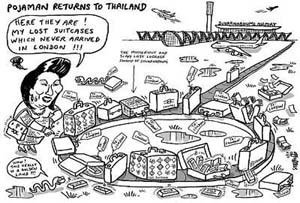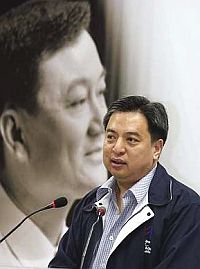Earlier that Thursday afternoon, sipping a big cup of coffee at home, the 42-year-old French cartoonist whose real name is Stephane Peray, had browsed the newspapers and questions automatically popped up in his mind.
“Why would she (Pojaman) return to Thailand?” “Maybe she wants to pack more suitcases and return to London?” and “Maybe she came to pick up the lost suitcases?”
“I remembered Pojaman flew to London last month with a lot of suitcases. And that a lot of bags were lost in Suvarnabhumi. So I combined the two and drew an absurdity out of something real,” explained Stephff, while sketching a cartoon, which involved Condoleezza Rice, Kim Jong-il, Shinzo Abe, Roh Moo-hyun and a nuclear bomb.
The “Pojaman” cartoon was for Stephff’s weekday cartoons for The Nation while the “nuclear bomb” was for newspapers in more than 25 countries.
The Bangkok-based cartoonist, whose cartoons have also appeared in Sin Chew Daily, is no stranger to Malaysia. Lat’s books made him interested in Malaysian life.
Stephff finds many similarities between the middle class in Thailand and Malaysia. “In Lat’s cartoons, there are Chinese who like shopping and new condominiums, which is similar in Thailand,” he said in a thick French accent.
In the last 13 years, he has satirised Thailand, politically, culturally and socially. And his recurring themes are nepotism and cronyism.
“This is a Thai-Chinese thing. Whenever you are in power, you have to share it with your family and friends,” he said. “Nepotism and cronyism are not bad in Asia. They make sense. You are supposed to help your family and friends.”
The cartoonist has poked fun at five Thai Prime Ministers – Chuan Leekpai, Banharn Silpa-archa, Chavalit Yongchaiyudh, Thaksin Shinawatra and Surayud Chulanont.
Who is his favourite prime minister, cartoon-wise?
It is not easy to find something funny about Chuan Leekpai, said Stephff, who was fired from the French navy because he drew a caricature of his “humourless” ship commander.
Chavalit has a particular face that is easy to draw and Banharn has an interesting face.
Thaksin is his favourite.
“Because Thaksin's always has some crazy, funny idea. It is easy to make funny something that is already funny,” he said.
Take, for example, the Thailand Elite Card.
Thaksin’s idea was to sell one million memberships at one million baht (RM100,000) each, which entitled holders privileges including fast-track immigration clearance and multiple entry visa within the first five years of its introduction.
Stephff is missing Thaksin, who is in self-imposed exile in London.
“You can get so many cartoon ideas from him,” said the Frenchman who drew his first cartoon (the insurgency in Thailand’s deep south) for The Nation in April 2003.
“If you get a very honest and wise guy, it would be difficult to find material to make fun of him.”
And that “difficult” person is General Surayud, who the military appointed as Thailand’s 24th prime minister on Oct 1.
“I’ve got nothing bad to say about him. And we journalists, if the world was perfect, are not supposed to exist any more,” he said while his eyes twinkled.
But he is not giving up hope on Surayud.
“It will take some time. At the moment he has been prime minister for 19 days only, so I need to learn more about him,” he said on Oct 19.
One of his favourite cartoons on Thailand is his caricature of Thaksin as a square-faced shark in the animation movie, Finding Nemo. He called his parody “Finding DEMOcracy”.
Thaksin, however, will feature less in his cartoons. “After the coup, I’m going after the new people in power,” he said. “The role of a journalist is to be a counter balance to the government.”
The stately Surayud will be a challenge to skew, however.







